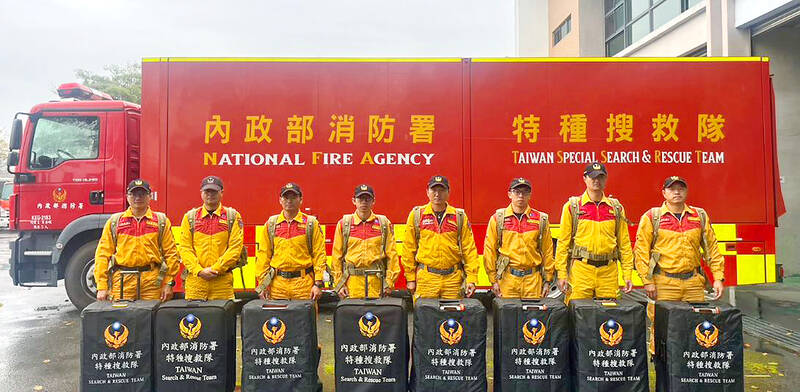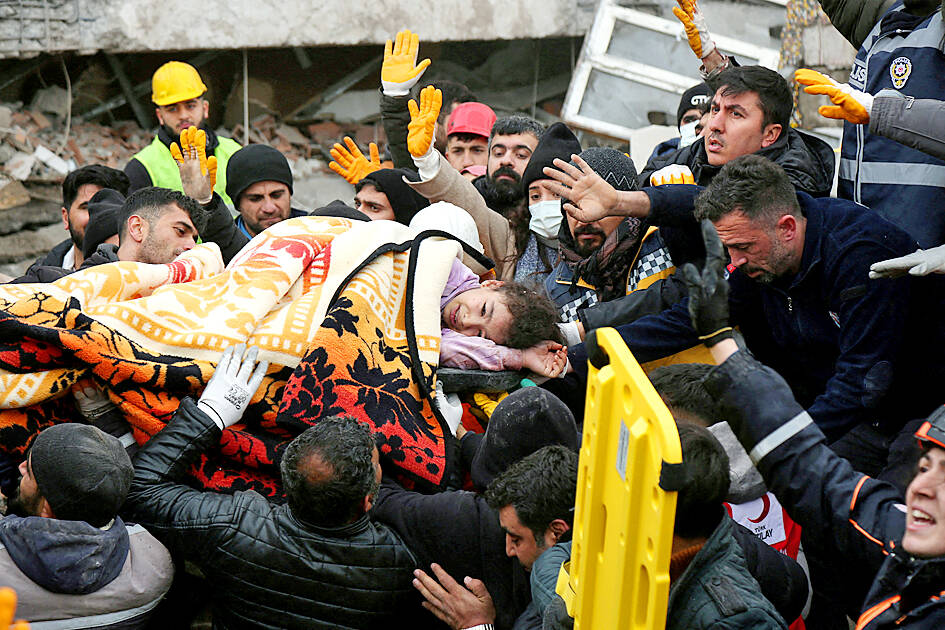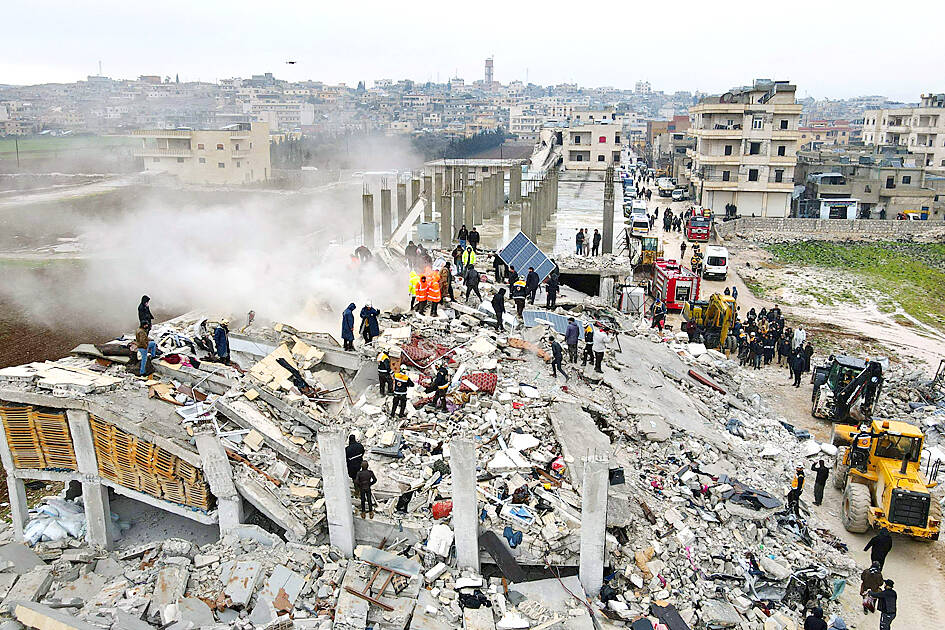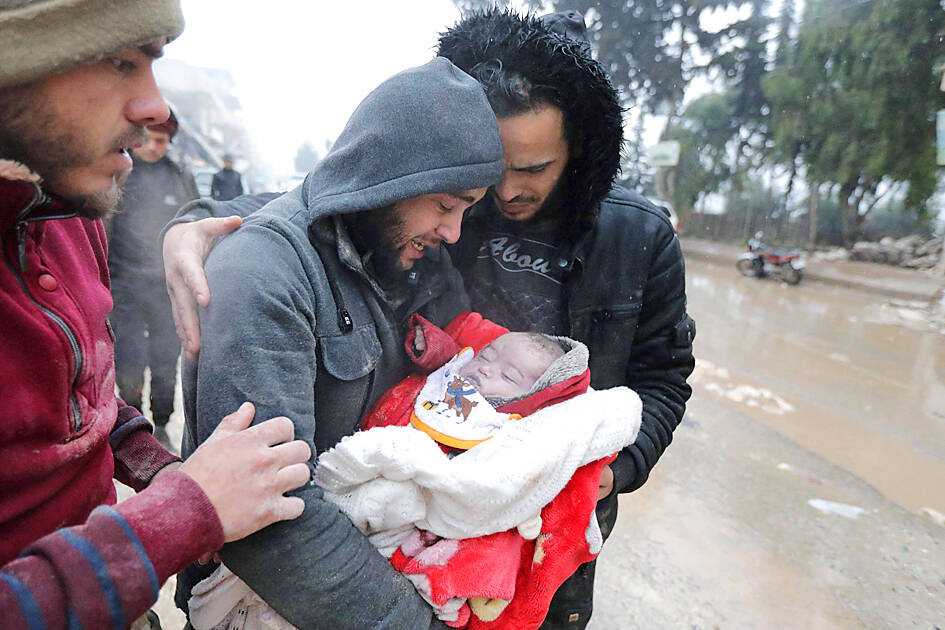President Tsai Ing-wen (蔡英文) yesterday sent her sympathies to the people affected by a powerful earthquake that struck Turkey and Syria, with the government pledging to donate US$200,00 to rescue efforts and providing disaster relief assistance.
The president also hopes for a quick recovery and a return to normal life there, Presidential Office spokeswoman Kolas Yotaka quoted Tsai as saying.
A team of 40 personnel and three search-and-rescue dogs, equipped with 4 to 5 tonnes of gear and devices, was scheduled to depart last night on board a Turkish Airlines flight, the National Fire Agency said in a press statement.

Photo: screen grab from the National Fire Agency’s Facebook page
The magnitude 7.8 earthquake rocked wide swaths of Turkey and Syria early yesterday, toppling hundreds of buildings and killing more than 1,500 people. Hundreds were still believed to be trapped under rubble, and the toll was expected to rise as rescue workers searched mounds of wreckage in cities and towns across the area.
Department of West Asian and African Affairs Director-General Anthony Ho (賀忠義) has also, on behalf of Minister of Foreign Affairs Joseph Wu (吳釗燮), conveyed his condolences to Turkish Representative in Taiwan Muhammed Berdibek, the ministry said.
The Taipei Economic and Cultural Mission in Ankara said that there had been no reports of Taiwanese casualties, but that it would continue to monitor the situation, it said.

Photo: Reuters
For emergency assistance, Taiwanese in Turkey can call the mission’s emergecy hotline at +90-532-322-7162, while their relatives in Taiwan can contact the ministry’s toll-free all-hours hotline in Taiwan at 0800-085-095.
On both sides of the Turkish and Syrian border, residents jolted out of sleep by the pre-dawn quake rushed outside on a cold, rainy and snowy night. Buildings were reduced to piles of pancaked floors, and major aftershocks continued to rattle the region.
Rescue workers and residents in multiple cities searched for survivors, working through tangles of metal and concrete. A hospital in Turkey collapsed, and patients, including newborns, were evacuated from facilities in Syria.

Photo: AFP
“Because the debris removal efforts are continuing in many buildings in the earthquake zone, we do not know how high the number of dead and injured will rise,” Turkish President Recep Tayyip Erdogan said. “Hopefully, we will leave these disastrous days behind us in unity and solidarity as a country and a nation.”
The quake, which was centered north of the Turkish provincial capital of Gaziantep, was felt as far away as Cairo. It sent residents of Damascus rushing into the street, and jolted awake people in their beds in Beirut.
It struck a region that has been shaped on both sides of the border by more than a decade of civil war in Syria. On the Syrian side, the swath affected is divided between government-held territory and the nation’s last opposition-held enclave, which is surrounded by Russian-backed government forces. Turkey, meanwhile, is home to millions of refugees from that conflict.

Photo: AFP
The opposition-held regions in Syria are packed with about 4 million people displaced from other parts of the country by the fighting. Many of them live in buildings that are already wrecked from past bombardments.
Hundreds of families remained trapped in rubble, the opposition emergency organization, called the White Helmets, said in a statement.
Strained health facilities and hospitals were quickly filled with wounded, rescue workers said.
The region sits on top of major fault lines and is frequently shaken by earthquakes. About 18,000 people were killed in a similarly powerful earthquake that hit northwest Turkey in 1999.
The US Geological Survey measured yesterday quake at 7.8. Hours later, a magnitude 7.5 one struck more than 100km away.
An official from Turkey’s disaster management agency said it was a new earthquake, not an aftershock, though its effects were not immediately clear.

CHAOS: Iranians took to the streets playing celebratory music after reports of Khamenei’s death on Saturday, while mourners also gathered in Tehran yesterday Iranian Supreme Leader Ayatollah Ali Khamenei was killed in a major attack on Iran launched by Israel and the US, throwing the future of the Islamic republic into doubt and raising the risk of regional instability. Iranian state television and the state-run IRNA news agency announced the 86-year-old’s death early yesterday. US President Donald Trump said it gave Iranians their “greatest chance” to “take back” their country. The announcements came after a joint US and Israeli aerial bombardment that targeted Iranian military and governmental sites. Trump said the “heavy and pinpoint bombing” would continue through the week or as long

TRUST: The KMT said it respected the US’ timing and considerations, and hoped it would continue to honor its commitments to helping Taiwan bolster its defenses and deterrence US President Donald Trump is delaying a multibillion-dollar arms sale to Taiwan to ensure his visit to Beijing is successful, a New York Times report said. The weapons sales package has stalled in the US Department of State, the report said, citing US officials it did not identify. The White House has told agencies not to push forward ahead of Trump’s meeting with Chinese President Xi Jinping (習近平), it said. The two last month held a phone call to discuss trade and geopolitical flashpoints ahead of the summit. Xi raised the Taiwan issue and urged the US to handle arms sales to

BIG SPENDERS: Foreign investors bought the most Taiwan equities since 2005, signaling confidence that an AI boom would continue to benefit chipmakers Taiwan Semiconductor Manufacturing Co’s (TSMC, 台積電) market capitalization swelled to US$2 trillion for the first time following a 4.25 percent rally in its American depositary receipts (ADR) overnight, putting the world’s biggest contract chipmaker sixth on the list of the world’s biggest companies by market capitalization, just behind Amazon.com Inc. The site CompaniesMarketcap.com ranked TSMC ahead of Saudi Aramco and Meta Platforms Inc. The Taiwanese company’s ADRs on Tuesday surged to US$385.75 on the New York Stock Exchange, as strong demand for artificial intelligence (AI) applications led to chip supply constraints and boost revenue growth to record-breaking levels. Each TSMC ADR represents

Pro-democracy media tycoon Jimmy Lai’s (黎智英) fraud conviction and prison sentence were yesterday overturned by a Hong Kong court, in a surprise legal decision that comes soon after Lai was jailed for 20 years on a separate national security charge. Judges Jeremy Poon (潘兆初), Anthea Pang (彭寶琴) and Derek Pang (彭偉昌) said in the judgement that they allowed the appeal from Lai, and another defendant in the case, to proceed, as a lower court judge had “erred.” “The Court of Appeal gave them leave to appeal against their conviction, allowed their appeals, quashed the convictions and set aside the sentences,” the judges